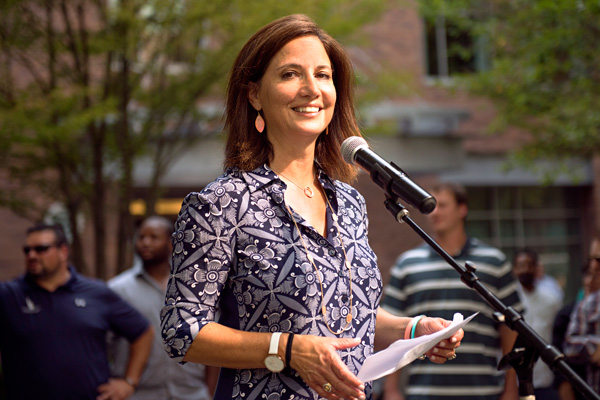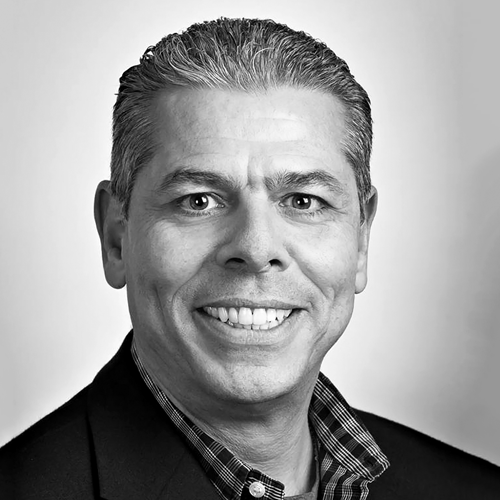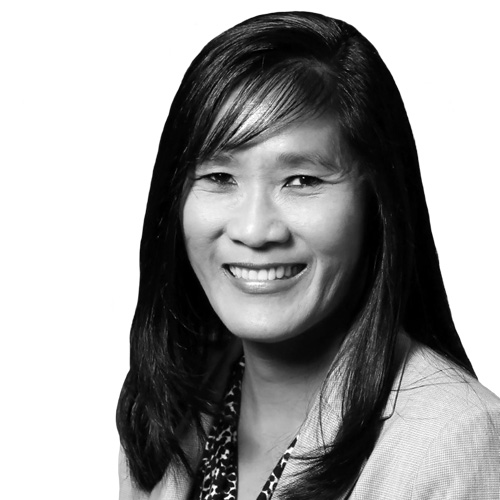On an early Saturday morning, a young Elizabeth “Liz” Lewis climbs into the car to join her father on his weekend rounds. While ophthalmologist Dr. Harvey Lewis checks on his patients, Liz heads to the pediatric ward. She talks to patients, entertains them with stories, and does favors for them. It’s those moments—those stories—that stick with her throughout high school, when she would come to work for her father at that same hospital.
Lewis was born to be in healthcare. As the daughter of a physician, she learned the value of patient advocacy at a young age. Today those patient stories drive her to succeed as a leader and patient advocate at Takeda Pharmaceuticals. Lewis is the head of patient advocacy and chief counsel of the global oncology business unit, and she ensures that the patient is the center of everything Takeda does.

“What I really like about my role is the direct access to patients,” Lewis says. “I love understanding and learning from them. We know more about their needs—about the potential impact our medicines may have on them. You can’t understand a patient without that access. You need to know what their journey looks like, what their struggles are, and what works for them.”
As a leader, Lewis has worked to make that more commonplace across the entire company. Patient advocacy has become more deeply established within the company since she came on board in 2002. Takeda has encouraged and ingrained the patient story into everything it does—from drug discovery and development to the marketing process. Lewis remembers one specific case with a former professional football player who had multiple myeloma. He came in to talk to the company’s sales force before speaking to the company’s executive team. Lewis was impressed by his speech.
“I’ve heard patients before—we’ve had lots of patients come in—but he really captured it for me and the company,” says Lewis. “He said, ‘What you do is sell life.’ Seeing that level of emotion and gratitude and willingness from a former pro athlete encouraged us to keep doing what we do. I think it was a real turning point for us.”
“It’s challenging, but you just have to get out of bed the next day and figure out what more you have to do. We can’t just stop. We can’t just stop because for every patient that passes away, there’s another person that’s diagnosed who needs help.”
It’s stories such as those that have helped Takeda to raise awareness and push new initiatives. And Lewis needs to have the ability to communicate and advocate for those initiatives. There are often challenges between wanting to do something and figuring out how the company can do it. Her legal role influenced the company to figure out how to move forward with new patient initiatives. She is tasked with extending the company’s ability to innovate through patient-driven care, and she also has to collaborate with external advocacy organizations. To do that, she needs to know what the issues are and how to communicate them to her team as well as those outside the organization. She has to be open to all perspectives because it’s that one voice that sees the issue differently and can improve patient advocacy. It ultimately lies on understanding how it might impact the patient. That means establishing best practices and building strong relationships that translate to operating a company with the highest level of integrity.
“I think that when you have trust and respect, that translates into the ability to do more and really work with patients to do as much as we can to help them on their journey,” Lewis says.
Integrity always circles back to patients’ stories. This can be a challenge at times, but it’s what gets Lewis out of bed every morning. “I’ve had an incredible opportunity to have met so many patients,” she says. “But this is cancer. Even though the prognoses for myeloma patients have improved since I came on board in 2002, it’s still not a curable disease. It’s always very sad when we have a patient that we’ve worked with pass away. It’s challenging, but you just have to get out of bed the next day and figure out what more you have to do. We can’t just stop. We can’t just stop because for every patient that passes away, there’s another person that’s diagnosed who needs help.”
Helping others is central to Lewis’s personal mission, so mentorship is something she is extremely passionate about. She believes her legacy is the people that she has mentored and developed along the way. “For me, being a mentor is helping other individuals really achieve their potential,” Lewis says. “Everybody has had a boss that’s really helped them move to the next level or really furthered their career. I also think mentoring is helping people to be their best.” For Lewis, that mentor was Lynn Shapiro Snyder. Lewis worked with Snyder right out of law school in 1998. On Lewis’s first day, Snyder gave her three major pharmaceutical projects that would come to define Lewis’s career. She always comes back to that moment when she mentors her team for success at Takeda.
As for Lewis’s future, she wants to continue advocating for patients. “I hate the question about the five-year plan,” says Lewis. “I’m so fortunate to have a job I love. So few people can actually get up in the morning and say they have a job they really love and love coming to every day. So what’s my five-year plan? My five-year plan is to make this function of Takeda even stronger and better than it is today—to evolve it to the next level.”


